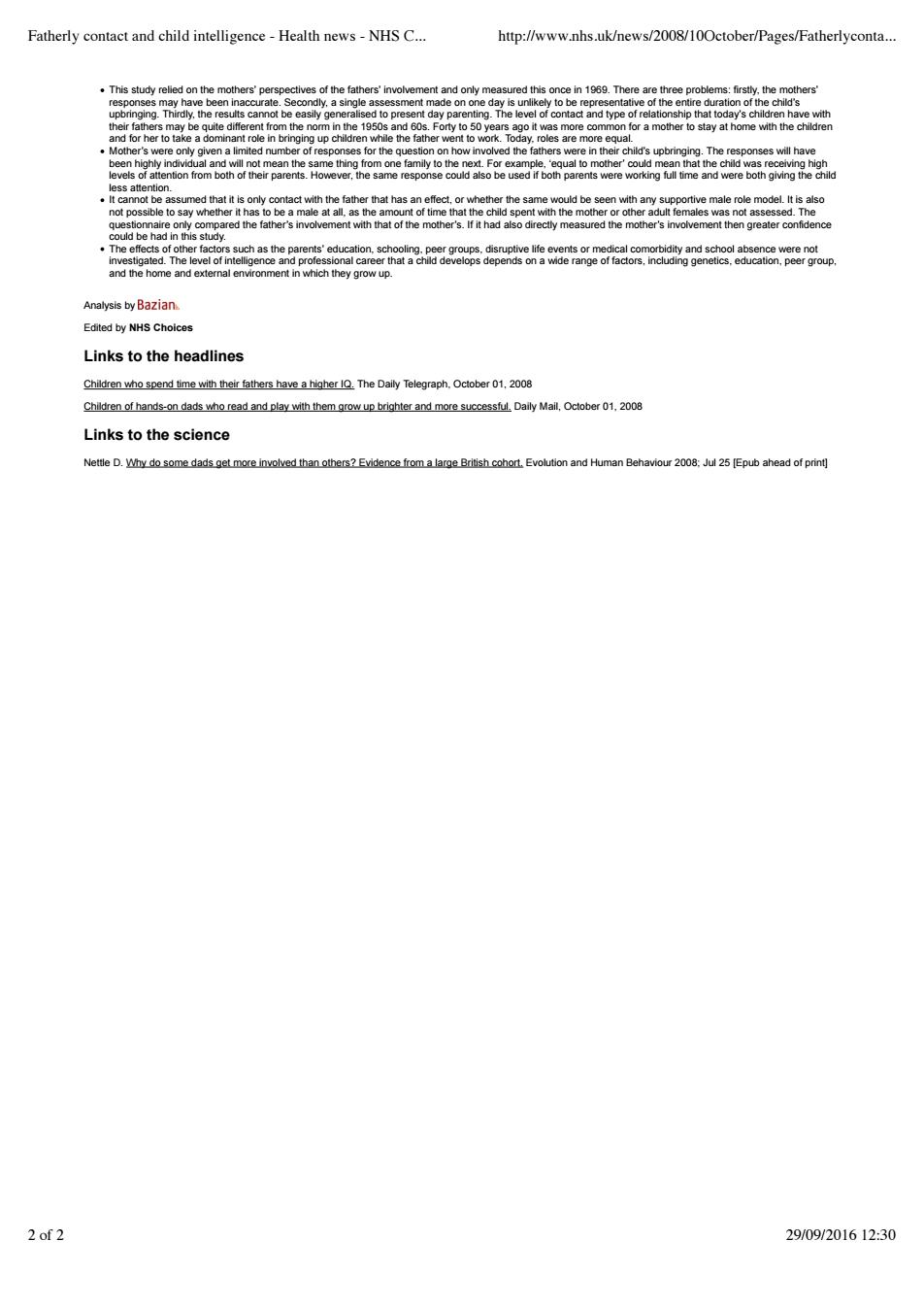正在加载图片...

Fatherly contact and child intelligence-Health news-NHS C... http://www.nhs.uk/news/2008/10October/Pages/Fatherlyconta... This study relied on the mothers'perspectives of the fathers'involvement and only measured this once in 1969.There are three problems:firstly,the mothers' responses may have been inaccurate.Secondly,a single assessment made on one day is unlikely to be representative of the entire duration of the child's upbringing.Thirdly,the results cannot be easily generalised to present day parenting.The level of contact and type of relationship that today's children have with their fathers may be quite different from the norm in the 1950s and 60s.Forty to 50 years ago it was more common for a mother to stay at home with the children and for her to take a dominant role in bringing up children while the father went to work.Today.roles are more equal. Mother's were a limited number of responses for the question on how involved the fathers were in their child's upbringing.The responses will have been highly individual and will not mean the same thing from one family to the next.For example,'equal to mother'could mean that the child was receiving high levels of attention from both of their parents.However,the same response could also be used if both parents were working full time and were both giving the child less attention. It cannot be assumed that it is only contact with the father that has an effect,or whether the same would be seen with any supportive male role model.It is also not possible to say whether it has to be a male at all,as the amount of time that the child spent with the mother or other adult females was not assessed.The questionnaire only compared the father's involvement with that of the mother's.If it had also directly measured the mother's involvement then greater confidence could be had in this study. The effects of other factors such as the parents'education,schooling.peer groups.disruptive life events or me edical comorbidity and school absence were not investigated.The level of intelligence and professional career that a child develops depends on a wide range of factors,including genetics.education,peer group and the home and external environment in which they grow up. Analysis by Bazian Edited by NHS Choices Links to the headlines Children who spend time with their fathers have a higher IQ.The Daily Telegraph.October 01,2008 Children of hands-on dads who read and play with them grow up brighter and more successful Daily Mail,October 01.2008 Links to the science Nettle D.Why do some dads get more involved than others?Evidence from a large British cohort.Evolution and Human Behaviour 2008:Jul 25 [Epub ahead of print] 2 of 2 29/09/201612:30This study relied on the mothers’ perspectives of the fathers’ involvement and only measured this once in 1969. There are three problems: firstly, the mothers’ responses may have been inaccurate. Secondly, a single assessment made on one day is unlikely to be representative of the entire duration of the child’s upbringing. Thirdly, the results cannot be easily generalised to present day parenting. The level of contact and type of relationship that today’s children have with their fathers may be quite different from the norm in the 1950s and 60s. Forty to 50 years ago it was more common for a mother to stay at home with the children and for her to take a dominant role in bringing up children while the father went to work. Today, roles are more equal. Mother’s were only given a limited number of responses for the question on how involved the fathers were in their child’s upbringing. The responses will have been highly individual and will not mean the same thing from one family to the next. For example, ‘equal to mother’ could mean that the child was receiving high levels of attention from both of their parents. However, the same response could also be used if both parents were working full time and were both giving the child less attention. It cannot be assumed that it is only contact with the father that has an effect, or whether the same would be seen with any supportive male role model. It is also not possible to say whether it has to be a male at all, as the amount of time that the child spent with the mother or other adult females was not assessed. The questionnaire only compared the father’s involvement with that of the mother’s. If it had also directly measured the mother’s involvement then greater confidence could be had in this study. The effects of other factors such as the parents’ education, schooling, peer groups, disruptive life events or medical comorbidity and school absence were not investigated. The level of intelligence and professional career that a child develops depends on a wide range of factors, including genetics, education, peer group, and the home and external environment in which they grow up. Analysis by Edited by NHS Choices Links to the headlines Children who spend time with their fathers have a higher IQ. The Daily Telegraph, October 01, 2008 Children of hands-on dads who read and play with them grow up brighter and more successful. Daily Mail, October 01, 2008 Links to the science Nettle D. Why do some dads get more involved than others? Evidence from a large British cohort. Evolution and Human Behaviour 2008; Jul 25 [Epub ahead of print] Fatherly contact and child intelligence - Health news - NHS C... http://www.nhs.uk/news/2008/10October/Pages/Fatherlyconta... 2 of 2 29/09/2016 12:30